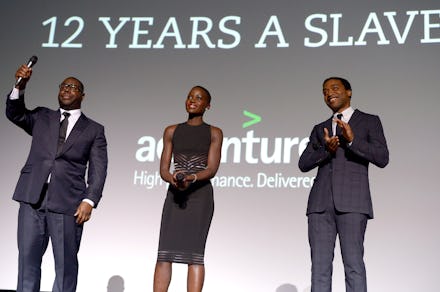2013 Has Changed the Game For Black Cinema

2013 has marked a sea change in African American cinema.
42: The Jackie Robinson Story, Fruitvale Station, Lee Daniels' The Butler, and 12 Years a Slave all depict the collective black struggle through impassioned individual stories. Hollywood, notorious for its inability to gauge shifting public sentiments, is finally understanding that moviegoers are especially interested in seeing cinematic interpretations of black history; a realization that I, as a woman of color, fully appreciate.
The year began with 42, the story of Jackie Robinson and his rise in baseball. Chadwick Boseman, a relative newcomer to the acting world, portrays the legendary sports icon. Next came Fruitvale Station, an emotional drama that depicts the last 24 hours of Oscar Grant's life before being murdered by a policeman in Oakland. Michael B. Jordan plays Grant in this harrowing tale; one so heart-wrenching, that it demands empathetic frustration. The film was produced by Forest Whitaker, who stars in The Butler. In that film, director Lee Daniels beautifully executed the complicated civil rights struggle in a story manifested through father and son. And the year closes out with 12 Years a Slave, a true story starring Chiwetel Ejiofor as Solomon Northup, a free Northern black man who is kidnapped and sold into slavery. These four movies all received wide acclaim, with Oscar nods and talks of other notable awards underway.
I laud these films for their ability to express the intricacies in having black skin. Our stories are often corrupted and skewed, thus fueling cultural appropriation and prejudice. Young people (of all colors) are to blame for perpetuating some of the more troubling stereotypes, mostly because we have little respect and interest in ethnic history. We are inundated with incorrect perceptions of race and culture, and indulge in vapid entertainment while ironically proffering our reliance on a mythical post-racial society.
These films help dismantle uneven notions of the black experience. In watching them, I regained a sense of self, an existential mode I often lose with the saturation of current black media. And what’s even more auspicious is the rise of young people who also embraced these films and comprehend the messages they present. Or so my Twitter feed suggests.
While the controversial Trayvon Martin trial led us astray, these films bring us back to an undeniable reality; slavery existed (12 Years), which led to Jim Crow — a series of legal restrictions that prevented the upwards social mobility of black people and eventually resulted in the civil rights movement (The Butler). Some black people overcame these hardships (42), but there continues to be a battle for true racial equity that sometimes leads to the death of the innocent (Fruitvale Station).
Black history 101. Take notes.
Although this has been a great year for showcasing part of the African American experience, there’s still work to be done. Hollywood continuously pigeonholes black people, commodifying our ancestry solely through pain, violence, and tragedy. We are often only shown as victims.
And while films that show the black struggle are necessary, so are those that show the other side of black life; the happiness and prosperity that’s been fostered through years of diligence and success. Perhaps The Best Man Holiday will do just that.
Until we break our victim status in mainstream media, we will be patronized by the army of well-intentioned but naive young people who visit the "country" of Africa, by the Madonnas of the world who solve black problems through neocolonialism, and by hipsters who gentrify poor black neighborhoods out of subconscious rebellion.
But I appreciate a good start when I see one.
The burgeon of quality black cinema is enlightening and inspirational; I enjoy viewing the intricate dynamics of my ancestry, and I enjoy doing so with a diverse audience from a variety of ethnic and cultural backgrounds. I admit that when I see my white friends applauding films like Think Like a Man, I feel a bond; a point of triumph in a society that shies away from race. With every movie that accounts both the struggle and success of the black saga, I grow closer to my heritage.